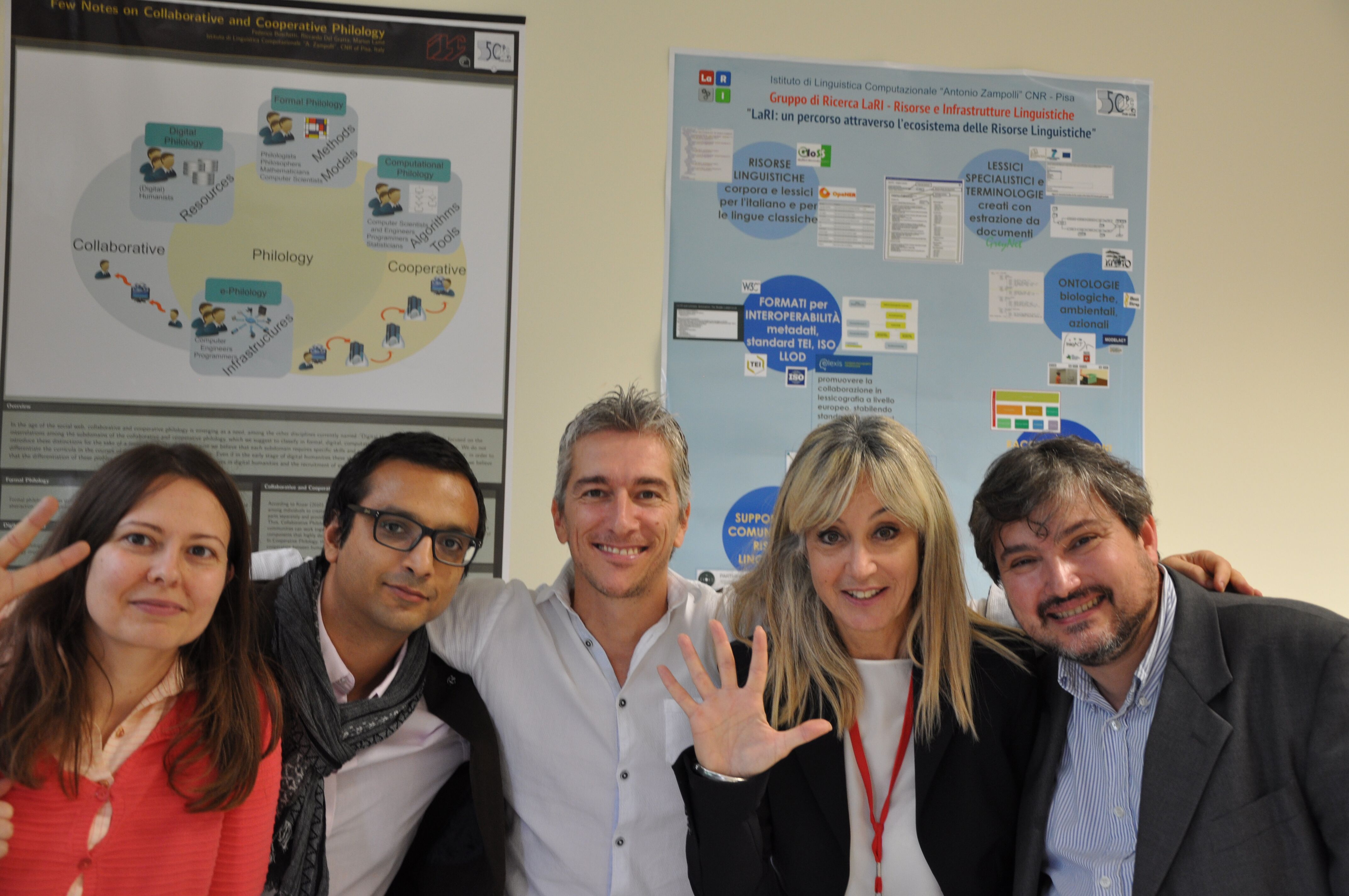Blog post written by Monica Monachini and Valeria Quochi, edited by Darja Fišer and Jakob Lenardič
The Italian CLARIN consortium, CLARIN-IT, has been a member of CLARIN since October 2015. The Italian National Coordinator is Monica Monachini. The consortium comprises 5 full members:
- the Institute for Computational Linguistics "A. Zampolli", which is the founding and coordinating node of CLARIN-IT (Monica Monachini),
- the Department of Education, Human Sciences and Intercultural Communication at the University of Siena (Silvia Calamai),
- the Centre for Comparative Studies “I Deug-Su” at the Department of Philology and Literary Criticism at the University of Siena (Francesco Vincenzo Stella)
- the Institute for Applied Linguistics at Eurac Research (Andrea Abel), and
- Fondazione Bruno Kessler (FBK) (Sara Tonelli).
A number of other Italian institutions have expressed their interest in participating in the consortium in the future, including the University of Pisa, the Scuola Normale Superiore and the University of Parma. Professor Anika Nicolosi at the University of Parma is currently involved with CLARIN-IT as an expert of Classics and Philology. CLARIN-IT also closely cooperates with the Consortium GARR on technical issues, in particular with the IDEM-GARR office that supports federated authentication in CLARIN. Because of this cooperation, any member or participant of the IDEM-GARR federation has access to the resources and services hosted in any CLARIN center via their institutional credentials.
CLARIN-IT has established two national centres: ILC4CLARIN, which is hosted by the Institute for Computational Linguistics "A. Zampolli" in Pisa and is a B-certified repository that has been active since 2016, and ERCC, which is hosted by EURAC Research in Bozen and is currently a C-certified repository that has been active since 2018 and aims to become a B-certified centre. Through the two repositories, CLARIN-IT offers a variety of resources and services, such as MERLIN, which is a multilingual learner corpus for German, Italian and Czech, and SIMPLE, which is a multi-layer lexicon of Italian based on the Generative Lexicon Theory. There are also several natural language processing and analysis tools, many of which are offered as web services and integrated into Weblicht.
The Italian consortium focuses on the field of Digital Classics, which still suffers from shortage or restricted availability of lexical resources for historical languages such as Ancient Greek, Latin or Sanskrit. To this end, the consortium aims to make some of the existing digitized resources for Ancient Greek and Latin available through its repositories (e.g. an LOD version of the -dict Perseus Liddell-Scott Jones dictionary), as well as to create new ones by enriching existing corpora and lexical datasets with Linked Open Data. CLARIN-IT also specialises in the research of non-standard forms of language as found in learner corpora and computer-mediated communication. CLARIN-IT also focuses on oral archives which are at the crossroads of speech sciences, digital humanities and digital heritage.
Some consortium members are involved in international infrastructural projects aiming to strengthen the cohesion of research across a number of related fields associated with the humanities, such as PARTHENOS (language studies and cultural heritage), ELEXIS (e-lexicography) and the new-born SSHOC project (European open cloud ecosystem of data and tools for social sciences and humanities). They are also active in standardization initiatives, such as ISO, TEI, W3, and international academic organizations and networks, such as Learner Corpus Association, Special Interest Groups on CMC and the COST Action European Network for Combining Language Learning with Crowdsourcing Techniques.

Monica Monachini (second from the right) and some members of ILC4CLARIN: Francesca Frontini, Fahad Khan, Andrea Bellandi, and Federico Boschetti
Valeria Quochi (CLARIN-IT User Involvement Manager) and Alessandro Enea (ILC4CLARIN Technical Manager)

Paola Baroni (CLARIN-IT Membership, Web and Communication Manager | ILC4CLARIN Web and Communication Manager) and Riccardo Del Gratta (ILC4CLARIN Repository Manager)

ERCC staff: Egon W. Stemle, Lionel Nicolas, Andrea Abel, Verena Lyding, and Alexander König
Click here to read more about Tour de CLARIN